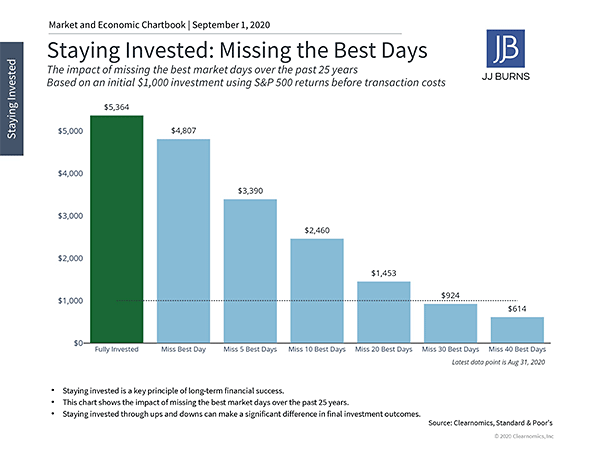2020 is certainly turning out to be a year for the books. It’s clear after speaking to many families all over the country that they are navigating economic uncertainty while trying to keep themselves and their loved ones safe from COVID-19. It’s a tall order. Not surprisingly, 51 percent of Americans have felt at least somewhat anxious about their finances since this pandemic began.
There has been one pretty notable silver lining, however. Even though the unemployment rate is currently 8.4 percent—and was in the double digits just last month—the stock market had a very strong summer. August was a particularly great month for the markets, and that momentum carried into the first days of September. On the second day of this month, both the S&P 500 and the Nasdaq hit record highs.

It has a lot of our clients wondering if they should take profits and sell their positions now and go to cash. On the surface, that looks like it would make a lot of sense given the recent market highs. But when you take a closer look at the data, it warns us that pulling out now will likely diminish your returns over the long run—not boost them.
For many, emotions represent the elephant in the room. We at JJ Burns & Company take a big pause whenever we hear phrases like:
- “My friend told me…”
- “I gotta feeling…”
- “The election is gonna be…”
- “This time is different…”
You can fill in the blank with more “feeling phrases.” Please take some time to see where your feelings lie—and then pause to take a look at the real facts. When you do, try to remember that feelings are not facts. It’s easy for emotions to cloud your judgment, but below are three reasons why it’s advantageous to stick with your investment plan.
1. History Shows Us That Trying to Time the Market Is a Losing Game
During periods when the market is performing really well, you might consider selling your positions and turning a profit. You may even feel the itch to buy some of the hot-flying tech stocks you’ve probably heard about. The allure is certainly there, but our advice is to step back, look at the big picture, consider your overall plan, and remember what the research and facts tell us.
It’s virtually impossible to come out on top trying to buy and sell at just the right time. A recent report by research firm Dalbar echoed the same. They looked at stock mutual funds investors from 1989 through 2019 and found that the typical investor underperformed by almost five percentage points per year. The reason? Misjudging when to move in and out of markets.
The urge to buy and sell, while understandable, is driven by fear—not sound investing advice. Abandoning your investment plan in the face of market volatility is a losing game. This is because doing so could very well mean missing out on some of the market’s best days.

The numbers speak for themselves. The green bar on the chart above shows how much money you would have earned off a $1,000 investment made 25 years ago, assuming you stayed invested the whole way through. Now look at how that return gets smaller and smaller for every top-performing market day you miss. Again, trying to time the good days is nearly impossible. The best way to catch them is to stay invested. It’s a core principle of long-term financial success. Of course, there’s also a bit more to this below.
2. Market Downturns Are No Reason to Pull Your Investments
Let’s look back over the last three decades. The S&P 500’s best-performing days all cropped up during down markets. This includes the dot-com crash and the Great Recession that followed the 2008 housing crisis. These are gains you would have missed if you’d pulled out along the way. You may be thinking, “Wouldn’t I have also missed the bad days?” Maybe, but is that really a gamble you want to take, especially given what the historical data tells us?
It’s also worth noting that if you take a long-term view and stay invested during down markets, you’re still likely to come out stronger. This can sometimes feel counterintuitive as it’s natural to feel more focused on the short term, especially if we let fear take the wheel. However, we’ve seen time and time again that taking the long view is a better approach. If you pull out now trying to miss the worst days, you might inadvertently end up missing the best days—and this can have a significant effect on your wealth.
3. Doing Nothing Is Usually Not Your Best Bet
Whether the markets are up or down, the best way to respond is usually to follow your personal written financial plan. Sticking with it often requires patience and practice. While it may be tempting to sell everything and sit out on the sidelines, rebalancing your portfolio back to original asset allocations that reflect your goals and best interests is usually a much wiser strategy because it keeps you invested.
Of course, if a life event like a job loss during a pandemic or a long-term illness disrupts the course of your life, changes understandably need to be made to your overall asset allocation in your financial plan. The right path forward is to schedule time with your financial advisor to explore all of your options, including scenarios you may not have even considered. A seasoned financial advisor has a wealth of knowledge and tried-and-true strategies to draw on, based on many years of working with hundreds of clients. While it isn’t wise to pull your investments entirely, there are other actions you can take together to put you in the strongest financial position.
Rebalancing your investment portfolio and tweaking your asset allocation can make a big difference to your big picture. In truth, this is something we recommend doing periodically no matter how the stock market is performing. Given the pandemic, now is as good a time as any for a financial checkup. If you have questions or concerns and want to talk them out with an advisor, we’d love to connect so that you can feel confident and empowered by your investment plan.
investing investments stock market




